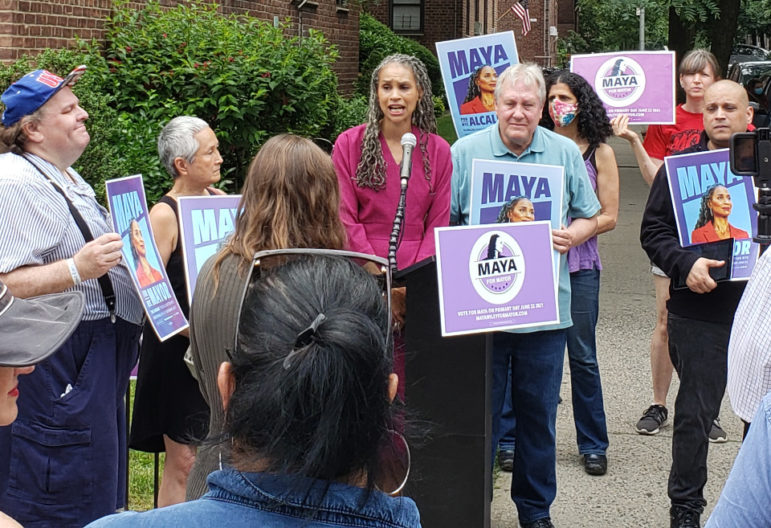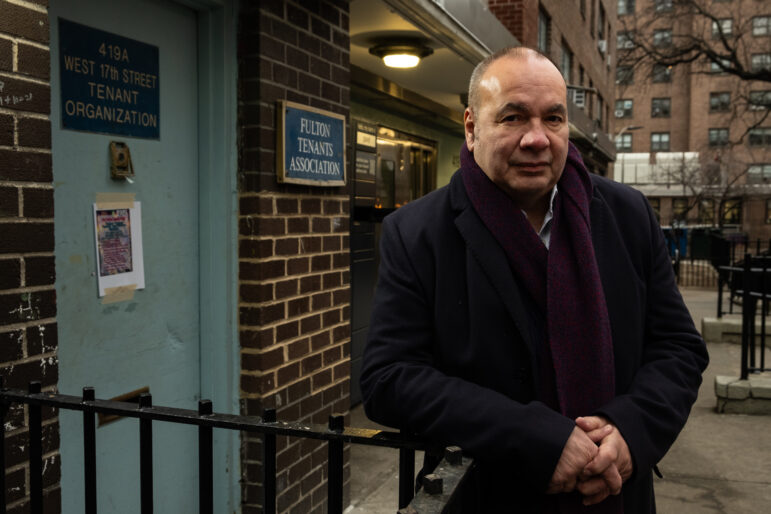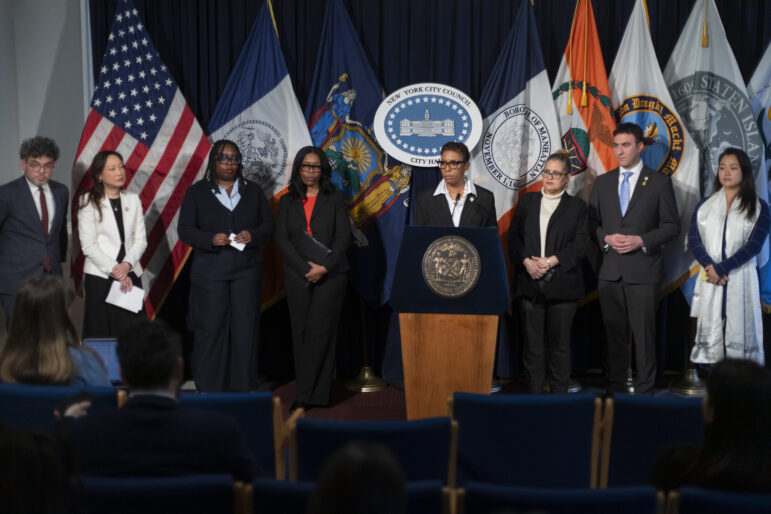“The thing about the CCRB is it’s a volunteer job, and you basically run the agency, even though you don’t get the support,” the mayoral hopeful said of her year-long stint at the Civilian Complaint Review Board.

Roshan Abraham
Maya Wiley speaks at a rally in Jackson Heights on June 13.Maya Wiley, who recent opinion polls have placed second and third in the June 22 primary race for New York City mayor, spoke at rally on 34th Avenue in Jackson Heights earlier this week. She touched on a number of topics: the city’s failures with online learning, calls for better broadband access and the political courage needed to improve the city.
What is needed, Wiley said, is “the courage to face the bureaucracy, the courage to face the NYPD.”
Wiley has been campaigning on, among other issues, her pledge to reform policing, including touting her past role as the chair of the Civilian Complaint Review Board (CCRB). But reporting by City Limits last week on Wiley’s CCRB tenure found that some were disappointed by her time at the oversight agency: Four former employees of Wiley said they were shocked at the abruptness of her departure after just more than a year in the job, which they said left no transition time and caused tumult at the already-dysfunctional board. Some said she appeared to still be closely aligned with the mayor during her time as chair, and continued a CCRB practice that let both the NYPD and City Hall weigh in on board reports.
City Limits also reported that Wiley had appointed a former aide into a new position as part of a behind-the-scenes power struggle with former Executive Director Mina Malik. The latter claim was further confirmed by reporting by ProPublica last Friday.
When asked after Sunday’s rally why she left the CCRB after only a year, Wiley once again attributed it to her job at the New School, saying the CCRB is a volunteer position that did not allow her to fully participate while working as both a professor and a department chair.
“The thing about the CCRB is it’s a volunteer job, and you basically run the agency, even though you don’t get the support,” Wiley said.
“It’s very unusual, because the charter creates the board as the decision making body for the agency. You’re doing budgeting, you’re hiring staff,” Wiley said. “And I had just gone to the New School and had two big jobs there.” At the time, Wiley was a faculty member at the Milano School of Policy and also vice president of social justice. Reporting at the time said she held both roles throughout her tenure at the CCRB.
“The way it’s structured, it’s pretty much a full-time job,” Wiley said.
Whether the CCRB chair is a volunteer position and the responsibilities it entails are disputed: The agency’s website states that members “receive compensation on a per-session basis, though some board members choose to serve pro bono.” Public records show Wiley was paid at a rate of $346 an hour for a total payout of $4498 to chair the CCRB for eight months in 2017 before resigning—equivalent to 13 hours of her time. Whether Wiley also spent significant time working for the CCRB outside of chairing its public meetings is unclear, and the CCRB did not return a request for clarification. Current Chair Frederick Davie was paid $3,150 for his role in chairing the agency in 2020, also at a rate of $346 an hour.
As far as her government work goes, the CCRB position was significantly smaller in its hours and total yearly pay than Wiley’s role as Mayor Bill de Blasio’s counsel, where she made $211,953 for seven months of work in 2016, according to public records.
A former employee of the CCRB who spoke on the condition of anonymity disputed Wiley’s explanation for her departure, as well as her claim that CCRB chair is a full time job or that the chair runs the agency. “The chair definitely does not run the agency, the executive staff does,” the former employee said.
Wiley also disputed the characterization of her departure from the CCRB as abrupt (four former employees told City Limits she left no transition time when she resigned from the role in 2017.)
“Oh no I mean I gave them some time, no it wasn’t just like I said, ‘I’m out,’” Wiley said, but could not recall how much advance notice she gave. (A former longtime CCRB employee strongly disagreed with Wiley’s characterization. “She left no transition,” they said in an email. “In all my years there, she has been the only chair who came in and said today is my last day.”)
Wiley said the work of the CCRB chair and her positions at the New School were leaving her stretched thin. When asked by City Limits whether the job of New York City mayor would exceed those combined responsibilities, Wiley pushed back.
“That’s an unfair question,” she said. “The mayor’s job is one job. I had three jobs. I was getting paid for two jobs. It’s a totally different thing.”
Wiley ended the interview to speak with supporters who had lined up to see her. She discussed aspects of her education platform, including increasing the role of parents and teachers in school governance.
“We’re going to fix what’s broken and we will not lose the next generation,” she told the crowd.








